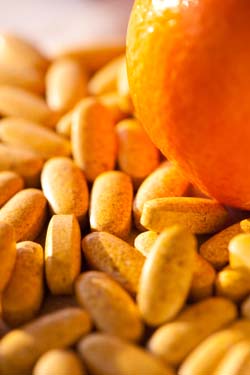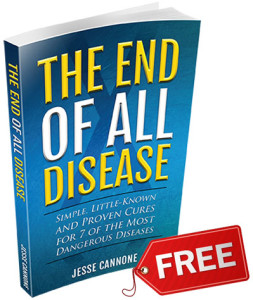
Can you really get
TOO MUCH Vitamin C?
It’s everywhere we look these days, isn’t it?
Everything from breakfast cereals to fruit juices seem to be either “fortified with” or “a good source of” vitamin C.
It may leave you wondering… just how many of these “good sources” can your body really handle every day?
And what happens if you get too much?
The Truth about Vitamin C
Vitamin C, or ascorbic acid, is found naturally in most fruits and vegetables. It’s one of the most important nutrients your body cannot produce on its own. And it enables multiple important enzymes to function in your body.
Why You Need Vitamin C in the First Place
You’ve heard how important vitamin C is before… but as a quick refresher, here’s some of its more important benefits:
1. Immune system support
Did you know scientists don’t actually know why your body consumes massive amounts of vitamin C when fighting an infection? They just know that it does! The working theory is ascorbic acid modulates all immune system responses, including supporting white blood cells and immune system signaling.
2. Stress relief
Stress, a common “bug” in our society, is also known to quickly deplete levels of vitamin C in your body. That includes not only on-the-job stress or dealing with traffic, but also the physical stress that alcohol, smoking and being overweight have on your immune system.
3. Antihistamine
Vitamin C also acts as a natural antihistamine. A 1992 study from Arizona State University showed that 2 grams of vitamin C daily not only prevents the release of histamine, but also helps the body detoxify from histamine’s immunosuppressing effects.
4. Collagen production
Vitamin C is essential in forming collagen, the protein that gives bones, cartilage, muscle fibers and blood vessels their structure.
Consistently rejuvenated collagen is also essential to maintaining your skin’s elasticity and youthful glow.
No surprise, then, that a 2007 study of over 4,000 women published in the American Journal of Clinical Nutrition showed that women with more vitamin C in their bodies also had moister skin with less wrinkles.
5. Fights cancer… guerrilla style
A study by the Situs Cancer Research Center in Arkansas currently in Phase 2 uses 1.5gm of ascorbic acid, delivered intravenously, to fight cancer tumors. The theory is that cancer cells do not have the enzymes required to break down hydrogen peroxide into water and oxygen.
Cancer sees vitamin C as a sugar and sucks it right up. The vitamin then breaks down into H202, killing the cancer from the inside, while sparing the surrounding cells its oxidative damage.
Not surprisingly, the FDA has suspended this study.
If this little molecule really contains these great body benefits, what’s with all the controversy lately, the FDA involvement… and how could you possibly overdose?
The Vitamin C Controversy
There are two levels to the vitamin C Controversy.
1. “Adequate Intake”
The U.S. Department of Agriculture states that the Adequate Intake (AI) for vitamin C is 75mg for adult women and 90mg for adult men. This can easily be taken in a half cup of strawberries, a single baked potato or a medium sized orange.
If this sounds shockingly low to you, you’re not alone. When the USDA says “adequate intake,” they really mean “just enough.”
In the case of ascorbic acid, the USDA’s “adequate intake” is just enough to prevent scurvy – yes, the sailor’s worst nightmare of yore. In truth, modern folk with access to grocery stores (even with today’s vitamin-depleted produce) or home gardens should never have to worry about scurvy.
Of course we know there’s much more to health then avoiding scurvy. But if you’re trying to merely follow the USDA’s adequate intake for vitamin C, good luck with that.
At any rate, some nutritional scientists insist there is no benefit to supplementing with ascorbic acid, and they stand by the USDA’s adequate intake requirements.
Other scientists, however, are positively shocked at the USDA’s misinformation.
2. The Vitamin C “Overdose” Theory…
When you consider the USDA’s adequate intake, it seems easy to “overdose” on vitamin C. It’s likely that this oddly low requirement is where the “overdose” theory first originated
Just because you go over the recommended daily amount (RDA) of a supplement doesn’t mean you’re “overdosing.” The upper limit, or UL, is the amount you shouldn’t go over. And vitamin C’s UL of 2,000mg is FAR higher than the government’s 75-90mg RDA.
…Isn’t much of a theory at all.
The truth is you would have to try really, really hard to actually overdose. The hole in the theory comes from the way your body physiologically interacts with vitamin C.
First, vitamin C is water soluble – meaning your body cannot store it for later use. Instead, your body automatically eliminates any extra vitamin C it can’t use right away through your urine.
An attempt to determine a toxic level of vitamin C was studied in 1936, wherein 143 subjects ranging from infant to adult were given up to 6 grams of ascorbic acid for more than 1400 days. A toxic reaction was only observed in 5 adults and 4 infants.
If you did manage to overdose, the typical symptoms would include upset stomach, diarrhea, headache, fatigue and trouble sleeping.
The only regularly mentioned negative aspect of taking an excessive amount of vitamin C is the fact that it enhances your body’s ability to absorb iron. For many people, that’s a good thing. Of course, if an iron overdose were allowed to develop that would be toxic and dangerous.
How to Make Sure You Get Enough Vitamin C
Ultimately, the health benefits of increasing your vitamin C intake are notable. And the evidence shows you would have to massively abuse vitamin C to “overdose” – and even then the side effects are typically mild.
Which means, for the vast majority of people, more vitamin C is better. But how much more?
Dr. Mark Moyad of the University of Michigan, who has reviewed over 100 studies on ascorbic acid, strongly recommends supplementing at least an extra 500mg of vitamin C per day to get all the benefits.
Of course, some of the best ways to get vitamin C in your diet naturally has always been to eat plenty of fresh fruits and vegetables, especially brightly colored and deep green varieties.
Finally, let me share one more amazing, yet little-known benefit of vitamin C:
Vitamin C Also Fights the Deadly T2 Toxin
The T2 toxin is likely one you’ve never heard of. It’s a food mold found mostly in dried peas, beans and lentils.
T2 is present in all cases of high blood pressure and kidney disease. But that doesn’t mean you have to give up your homemade split pea soup to protect your body.
“T2 toxin can be detoxified in 5 minutes by adding vitamin C to the water [peas, beans, and lentils] are soaked in,” explains Dr. Hulda Clark. “Remember to throw away imperfect ones, first.”
Vitamin C is one of my go-to sources for detoxifying everything from honey to potatoes. You’ll find an amazing array of information on vitamin C and other ways to detoxify your body naturally in The End of All Disease book.
—-
The use of vitamin C to fight disease is literally only the tip of the iceberg of great health advice found in The End of All Disease. And I have some great news for you… if you act fast, you can grab yourself a FREE copy of the book.
1) Since we’re giving you the book free, we ask you to cover the shipping.
2) You need to get your copy before they’re gone. So if you have any interest in natural health cures whatsoever, I highly recommend you ask for your copy right now.
Click Here to Get Your FREE Copy of
The End of All Disease
Copies are limited, so don’t wait!
References
Cosgrove MC, et al. Dietary nutrient intakes and skin-aging appearance among middle-aged American women. American Journal of Clinical Nutrition. 2007 Oct;86(4):1225-31.
Clark H. The Cure for All Diseases. 1995.
Johnston CS. Antihistamine effect of supplemental ascorbic acid and neutrophil chemotaxis. Journal of the American College of Nutrition. 1992 Apr;11(2):172-6.
Mosure J. Vitamin C (Asorbic Acid). Ohio State University Extension Fact Sheet: Department of Human Nutrition. 2004 Nov.
Stellpflug C. Vitamin C and the big ‘C’. Natural News. 2012 Jun 5.
Murphy GD, Bolt J. Study of High Dose Intravenous (IV) Ascorbic Acid in Measurable Solid Tumor Disease. Situs Cancer Research Center. 2012 Aug 25.
Zelman K. The Benefits of Vitamin C. WebMD: Weight Loss and Diet Plans. 2010 Jan 7.
World Health Organization. Toxicological evaluation of some food additives including anticaking agents, antimicrobials, antioxidants, emulsifiers and thickening agents. Who Food Additives Series No. 5. 1974.



Regarding Dr. Clark’s recipe:
Unpateurized organic apple cider vinegar should be used in place of white vinegar. Nearly all white vinegar comes from petroleum based products and is processed with sulphuric acid and ammonia.
If thyme and fenugeek isn’t organic most likely it’s irradiated and processed with maltodextrin.
Vitamin C powder is usually ascorbic acid. Ascorbic acid is not vitamin C and does not contain the same molecular structure as “real” vit. C. Over 90% of the ascorbic acid on the market is extracted from GMO corn.
Not having Dr. Clark’s book she may have addressed these important facts.
I am surprised that there is no mention of Nobel Laureate Dr. Linus Pauling in your article.
Dr. Pauling was one of the biggest advocates for adequate daily intake of vitamin C.
Sounds good if you exchange the olive oil for organic coconut oil, the white vinegar for organic apple cider vinegar and the sugar for raw honey.